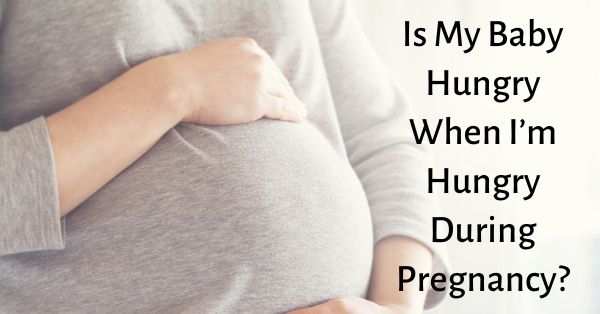While preparing for an evening walk with my 6-months pregnant friend, she requested me to pack lots of snacks. Emma confessed to getting hungry constantly since she started her third trimester. Also, her baby got more active whenever she was starving. Are you like Emma and are asking, “Is my baby hungry when I’m hungry during pregnancy?”
Let’s find out how babies feed while in the womb and if the baby’s overactivity commonly felt by hungry pregnant mothers means they’re hungry.
Read on to discover.

Is My Baby Hungry When I’m Hungry During My Pregnancy?
No. Your baby doesn’t get hungry when you’re hungry during pregnancy. A fetus does not feel hunger sensations when in the womb. The newborn’s digestive system isn’t usually fully developed during this time to enable food digestion.
Also, the unborn baby gets nutrients and vitamins through the placenta and umbilical cord. When you eat, they suck vital nutrients first and even have fat reserves. So, even if you skip a meal, your little one won’t feel it, as it has an endless supply of nourishment.
That said, pregnant women must take a balanced diet. Malnutrition or poor feeding may cause congenital disabilities or health conditions in babies.
I know about the notion that women eat for two during pregnancy, but it’s often about the body developing a growing need for energy for use by the mother and growing baby.
If you notice some extra pounds, that’s normal. When your baby takes vital nutrients and minerals first, you’ll frequently experience hunger, making you eat often.
Why Does My Baby Kick More When I’m Hungry?
Most women feel kicks and activity in the womb when hungry, which subsides soon after feeding. A Biomed central study reported 34% increased fetal activity before meals and 74% during meals. This brings the widespread belief that the baby gets hungry when her mother is hungry. Scientifically, this isn’t true. So, why does munchkin give you protest-like kicks before meals?
To answer you, the baby needs enough blood sugar to move around or play in the womb. When this sugar level reduces due to maternal hunger, the baby communicates by kicking more to alert you of the need to boost blood sugar through eating.
Babies stop kicking after meals because their blood sugar is restored to normal levels. Some women may still feel more activity from their babies after eating because the increased energy levels give munchkin energy to play more.
If you don’t eat well, you may feel decreased baby movements as nutrients and oxygen gradually diminish. Reduced kicking overtime is a danger sign, so you need to call your doctor immediately.
Do Babies Get Hungry In The Womb?
Unborn babies don’t know how hunger pangs feel. Mothers, too, can’t tell when the baby is hungry during this stage since babies don’t have a hunger-satiety cycle. They don’t directly eat what the mother consumes.
A fetus gets nourishment through the umbilical cord after passing through the placenta for filtration. The placenta quickly absorbs essential nutrients from you and stores them for future use. These reserves ensure your baby has an endless flow of nutrition, regardless if the mother feeds or not.
During birth, the placenta is removed, and the umbilical cord is cut. The baby starts feeling hunger sensations. He has to breastfeed and eat whenever he feels hungry.

How Do Babies Feed In The Womb?
Babies don’t eat what you eat. Their digestive system develops gradually until birth. Meanwhile, they get nourishment from the mother’s bloodstream to their umbilical cord.
The question, “can babies in the womb get hungry “is prevalent in parenting forums due to the confusing feeding cycle in unborn babies. The placenta begins to form 6-8 days after fertilization and is fully functional from 8-12 weeks of pregnancy.
Without a placenta, babies get nutrition by digesting the amniotic fluid. Further, the endometrium cells – ones that multiply to form the placenta- provide glycogen to the growing baby. Soon the placenta is fully-formed. It takes over the work of supplying nutrients.
Scientists describe a mother’s and foetus’s relationship as symbiotic or parasitic. According to Scientific American, besides transporting food and wastes, cells may migrate from the mother to the foetus through the placenta and reside in many organs, such as the lungs and kidneys.
When you eat food, say, snacks, they get digested in your body, and nutrients are released into your bloodstream. From here, nutrition passes through the placenta for sorting and storage. After filtering the best vitamins and nutrients for the baby’s consumption, the placenta channels them to your baby using the umbilical cord.
Is It Normal To Feel Frequent Hunger During Pregnancy?
Yes. A pregnant woman’s body needs more nutrition to sustain the growing baby. It’s common for women to experience increased appetite due to hormonal changes.
As your baby takes more nutrients, they leave you with a need to refill by eating more. Take diets rich in fiber and fluids, as they are known to keep you feeling full for longer. Take healthy snacks in between meals too.
Don’t worry about some weight gain during this period as long as you eat the right portions. It’s easier to deal with losing weight after delivery than having a sickly baby from underfeeding while you are pregnant.
Wrapping Up
From research findings, it’s common for women to feel more activity from their babies before meals. This begs the question: is my baby hungry when I’m hungry during pregnancy?
Does my unborn baby feel hungry?
Let’s explore a few points.
Unborn babies don’t eat the food we eat directly. The placenta sucks nutrients and passes them to the umbilical cord through the bloodstream.
Since the placenta has fat reserves, your baby has a constant supply of nutrition and may not be affected if you go hungry for a short time. However, have a balanced diet to enhance your baby’s health.
Unborn babies don’t have a functional digestive system and cannot feel hunger sensations. When you feel more kicks, they communicate to you about reducing blood sugar. Talk to your pediatrician if you’re worried about your baby being active or inactive before and after meals.
More to Read: